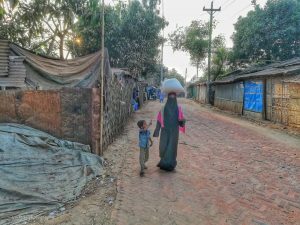Nearly a million Rohingya Muslims live in the refugee camps of Cox’s Bazar, Bangladesh. Life in the camps is hard. Refugees reside in squalid bamboo and tarpaulin shacks in areas that swelter in summer and flood in the rainy season making them subject to swamps and landslides. Services are inadequate and there is constant suffering among the Rohingya families. There is no hygienic sanitation and a lack of clean water. The medical facilities are inadequate and there is no appropriate education for children. In 2023 the World Food Program (WFP) cut rations by 17% causing many refugees to go hungry. Tragedy strikes the refugee camps constantly. People get sick from diseases and children drown or get buried in landslides. There are assaults, abductions, rapes and murders that serve to continue the genocide of the Rohingya people. Rarely is anyone called to account. Refugee life is so unbearable that most camp residents long for their homeland, but the prospect of repatriation back to Myanmar is neither safe, nor is it desirable due to the destruction of homes and the government acquisition of Rohingya lands. Added to this, there is ongoing fighting. The continuing persecution of the Rohingya people, which is taking place in the homeland makes it unsafe and far from suitable for any repatriation.
The genocide carried out against the Rohingya continues, both in the homeland and in the refugee camps. The Bangladesh camps have now been infiltrated by terrorists. Two groups, one of which fought against the Myanmar junta, are now fighting with each other and threatening the refugees who refuse to join them in the ongoing violence. No one is safe in the Bangladesh camps. The sound of shooting can be heard on most nights and the images of bodies left dead and mutilated in the streets or in shelters appear constantly on the Internet, but no one is keen to address the problem.
Notably, the word ‘camp’ means a place of temporary shelter, but for most refugees the camps are a home for life. Only 1% of the world’s refugees ever get resettlement in a third country. In reality, the word ‘camp’ is a euphemism for a prison, a place where unwanted people are confined so they don’t integrate with the population of the host country. Almost all displaced persons are victims of wars and capitalist development, with only a small portion of refugees having suffered from natural disasters.
No one comes to the aid of the Rohingya people because they are caught in the struggle for economic supremacy in the region. Myanmar is influenced by two of the world’s super powers China and Saudi Arabia, both of whom have crucial investments in Myanmar’s bourgeoning industries. That said, these industries need cheap labour, hence the interest in repatriating the Rohingya. Development and global business get priority over the rights of indigenous people and this is a pattern across the world. With this in mind, the Rohingya have very little hope of a good future in their homeland. As for life in the camps, the Rohingya are constantly punished for being who they are. They are beaten, abused, robbed of what little they have and denied their dignity and human rights.
As more of the refugees long for their homeland, the question as to whether repatriation will ever be possible is something the world chooses to ignore. Capital, politics and military expansion in the regions come before human beings. Refugees are collateral damage, a blot on the landscape, a byproduct of wars, militarism and capitalist expansion. Many of the Rohingya families have spent more than thirty years in the Bangladesh camps. Many refugees were born in the camps, but they are not afforded citizenship as prescribed by international laws. Many Rohingya refugees arrived in 2017 to escape the ethnic cleansing carried out by the Myanmar junta. Since then, there have been various attempts at repatriation by the Bangladesh Government, who just want to be rid of the Rohingya problem. However, it is against international law to return refugees to a war zone. Bangladesh is not a signatory to the Refugee Convention, but it must still act in accordance with what the world will accept as humane, but this does not stop the alleged bribery and corruption or the turning of a blind eye to criminal behaviour that serves the government’s best interests.
Myanmar remains very unstable and unsafe for the Rohingya people. Nonetheless, in May of 2023 Bangladeshi officials made several trips to Myanmar in order to seek repatriation for the refugees. It was widely reported that twenty Rohingya Muslim refugees and seven Bangladeshi officials visited Maungdaw Township and nearby villages in Rakhine State in order to create plans for resettlement, but there were no guarantees for the safety of refugees. The plan was to delegate the refugees to Myanmar’s refugee camps, which was deemed unacceptable.
The majority of the Myanmar population are Buddhists and they have constantly expressed their dislike of the Rohingya Muslims. In addition, the Myanmar government seemingly has no intention of restoring rights to the Rohingya people. The Rohingya are not even recognised for who they are, rather they are called Bengalis and aliens. With no recognition of a Rohingya identity or human rights the notion of repatriation to the homeland is an extremely dangerous one for the Rohingya families.
What next? The only solution for the Rohingya is resettlement in a third country, in which case governments have to open their borders and increase their intake of refugees. Alternatively, (or in addition) Bangladesh has to accept the refugees as residents and give them citizenship. Integration into the Bangladesh community makes more sense for a lot of the Rohingya refugees as they have grown up learning the Bangla language and culture and they are certainly more Bangladeshi than they are Bengali.
Regardless of all the difficulties, the world has to remember that the refugees are human beings and they deserve a normal, safe and productive life. There needs to be a radical change in the way the world deals with displaced persons. Refugee camps are cruel and unproductive places and they are a breeding grounds for criminals and terrorists. Either the camps should be closed, or they need to be opened up to the outside population so a proper integration of the refugees and host communities can take place. The shelters must go and proper housing and services need to be established.
There is no easy solution to the Rohingya situation and there is no will to bring about change, so the suffering of the Rohingya people continues. As the wars escalate unabated, more refugees are needing shelter in camps. While the circumstances worsen many more desperate people are seeking passage elsewhere with illegal human traffickers. Hundreds of refugees who take this journey die at sea. At the same time countries such as Malaysia are constructing huge new prisons for refugees, which could very easily become the modern day labour camps (otherwise known as vocational education camps) like those in China. While the prospect for a good future for refugees does not look good, we must continue to struggle for peace and justice. We must remain positive and ever hopeful of a good outcome.
Dr Chris James.
4/11/2023.


